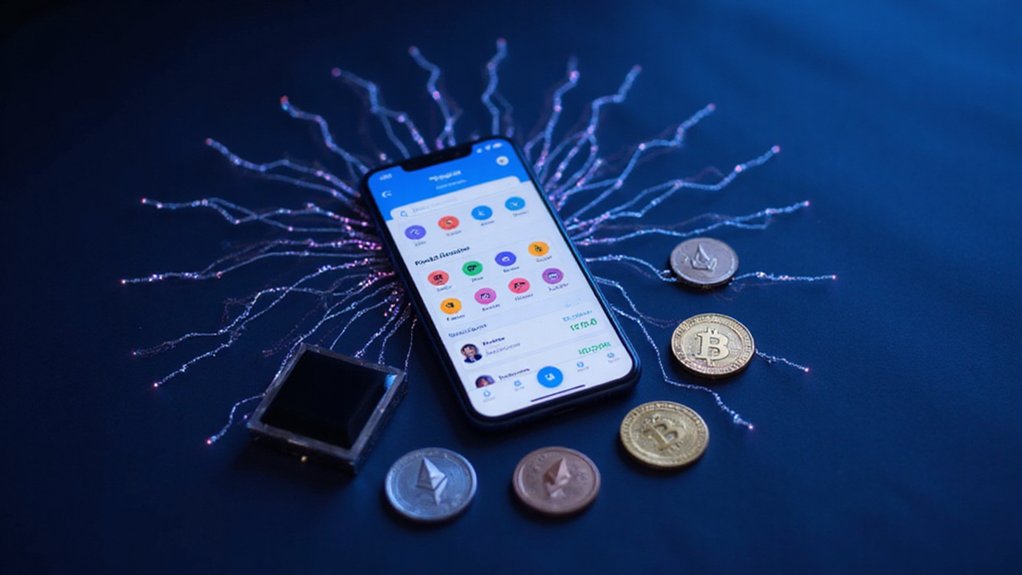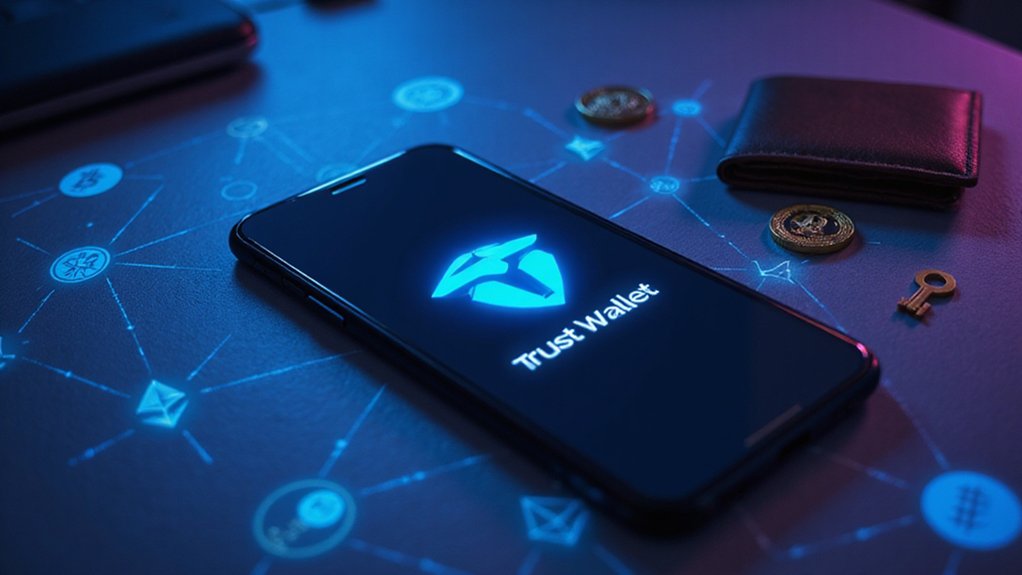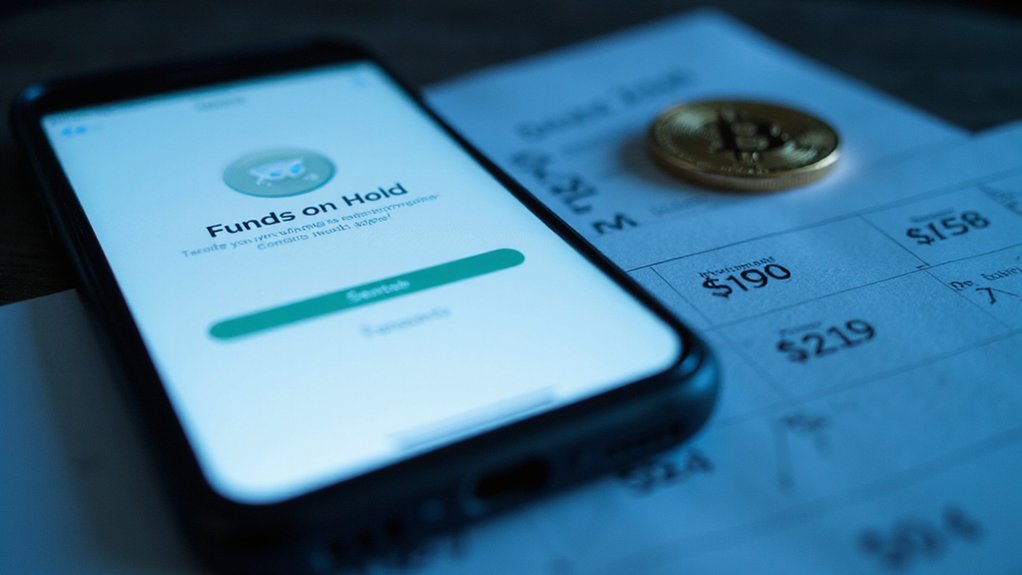Trust Wallet is a self-custody cryptocurrency platform that empowers users with complete sovereignty over their digital assets. This non-custodial wallet supports more than 100 blockchain networks, providing access to over 10 million assets and 600 million NFTs through its intuitive interface. Users can buy, sell, swap, and stake crypto while maintaining control of their private keys—a paradigm where financial autonomy comes bundled with responsibility. The platform’s blockchain-agnostic approach makes it an increasingly popular portal to the decentralized universe.

How does one traverse the labyrinthine world of cryptocurrency without surrendering control of one’s digital assets?
Trust Wallet presents a compelling solution to this perennial conundrum, offering a self-custody crypto wallet that places both autonomy and accessibility at the forefront of its design philosophy.
This non-custodial platform enables users to maintain complete sovereignty over their private keys—a novel departure from the centralized alternatives that require an almost ecclesiastical faith in third-party stewardship.
Trust Wallet’s architecture supports over 100 blockchain networks, granting access to more than 10 million digital assets and 600 million NFTs (those peculiar digital collectibles that continue to command inexplicable valuations in certain circles).
The wallet’s security framework incorporates encryption protocols and recovery phrases, providing safeguards against the ever-present threat of digital asset misappropriation.
However, users must remember that with great financial autonomy comes great responsibility; the platform places the onus of private key security squarely on the individual’s shoulders.
Beyond basic storage capabilities, Trust Wallet accommodates the full spectrum of cryptocurrency activities—buying, selling, swapping, and staking—while facilitating seamless interaction with decentralized applications.
This versatility has contributed to its growing popularity among both neophytes taking their first tentative steps into the crypto ecosystem and battle-hardened traders traverse the volatile waters of decentralized finance.
The platform’s technical infrastructure achieves the delicate balance between extensive blockchain compatibility and user experience, operating across Bitcoin, Ethereum, Binance Smart Chain, and myriad other networks through API-based integration.
This blockchain-agnostic approach guarantees that users need not sacrifice access to certain digital assets due to technological limitations.
Unlike traditional wallets that physically store money, Trust Wallet and other crypto wallets merely secure the keys that prove ownership of blockchain-based assets.
Trust Wallet’s intuitive interface belies the complexity of its underlying technology, providing educational resources for those requiring additional guidance while maintaining the sophisticated functionality demanded by experienced users.
In an industry often characterized by arcane mechanics and prohibitive barriers to entry, Trust Wallet offers a invigoratingly accessible portal to the expanding universe of digital assets.
Frequently Asked Questions
How Can I Recover My Trust Wallet if I Lose My Device?
Recovering a Trust Wallet after device loss hinges entirely on possession of the 12-word recovery phrase—that cryptographic lifeline prudently recorded offline during setup.
One simply downloads the official Trust Wallet app on a new device, selects “Restore Wallet,” and meticulously enters the recovery phrase.
Without this sequence of seemingly random words (which, ironically, represents one’s entire digital fortune), permanent loss is inevitable—no customer service representative can override this mathematical reality.
Proper offline storage of this phrase is, thus, non-negotiable.
Does Trust Wallet Charge Fees for Transactions?
Trust Wallet itself doesn’t impose transaction fees—a key distinction often overlooked by crypto neophytes.
Rather, users pay network fees directly to blockchain validators or miners, with costs varying wildly depending on blockchain congestion and protocol requirements.
While Bitcoin might command eye-watering fees during high-volume periods, alternative networks offer more economical options.
Trust Wallet merely facilitates transactions, allowing users to adjust fee parameters to balance confirmation speed against cost—the age-old blockchain dilemma.
Can I Connect Trust Wallet to Hardware Wallets?
Yes, Trust Wallet can connect to hardware wallets, specifically Ledger devices, through its Browser Extension.
This integration creates a convenient multi-wallet interface while maintaining the security benefits of cold storage.
Users can seamlessly toggle between Trust Wallet addresses and Ledger addresses within the extension, with transaction signing still requiring physical confirmation on the hardware device—a prudent combination of accessibility and protection that acknowledges the eternal security-convenience trade-off in cryptocurrency management.
Is Trust Wallet Available in All Countries?
Trust Wallet is technically available worldwide, with its non-custodial, decentralized architecture circumventing many traditional barriers to entry.
However—and this is where regulatory realities intrude—local restrictions may impede access in certain jurisdictions with particularly stringent crypto regulations.
While downloadable from major app stores globally (including confirmed access in Saudi Arabia), specific features like fiat on-ramps might face regional limitations.
The absence of a published “banned countries” list suggests near-universal availability, notwithstanding potential localized compliance hurdles.
How Does Trust Wallet Compare to Metamask?
Trust Wallet and MetaMask diverge significantly in their blockchain support breadth.
While Trust Wallet accommodates multiple chains and offers fee-free swaps, MetaMask primarily orbits the Ethereum ecosystem with swap fees attached.
The former presents a more intuitive interface for crypto neophytes, whereas the latter excels in dApp integration—particularly via browser extensions.
NFT capabilities also differ substantially; Trust Wallet’s multi-chain support trumps MetaMask’s primarily Ethereum-focused functionality.
Both wallets maintain open-source security with user-controlled keys.









